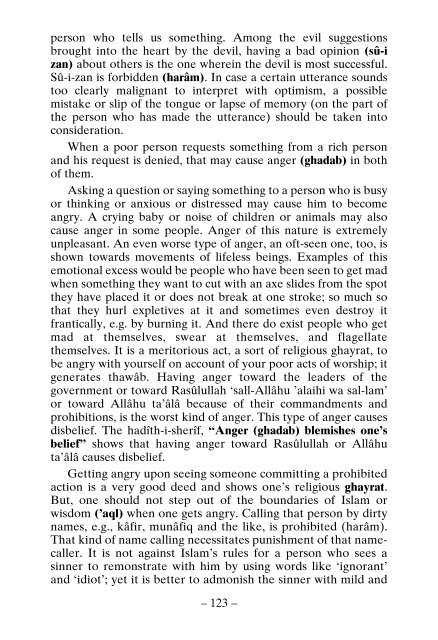Ethics of Islam
Ethics of Islam is taken from the book Berîka by Muhammad Hâdimi. Immorality and ways to get rid of it; 40 depravities and cures to them; usefulness of ethics; what is a soul; strengths of a soul; Personalities emanating from wisdom, courage, chastity and justice are extensively explained.
Ethics of Islam is taken from the book Berîka by Muhammad Hâdimi. Immorality and ways to get rid of it; 40 depravities and cures to them; usefulness of ethics; what is a soul; strengths of a soul; Personalities emanating from wisdom, courage, chastity and justice are extensively explained.
Create successful ePaper yourself
Turn your PDF publications into a flip-book with our unique Google optimized e-Paper software.
person who tells us something. Among the evil suggestions<br />
brought into the heart by the devil, having a bad opinion (sû-i<br />
zan) about others is the one wherein the devil is most successful.<br />
Sû-i-zan is forbidden (harâm). In case a certain utterance sounds<br />
too clearly malignant to interpret with optimism, a possible<br />
mistake or slip <strong>of</strong> the tongue or lapse <strong>of</strong> memory (on the part <strong>of</strong><br />
the person who has made the utterance) should be taken into<br />
consideration.<br />
When a poor person requests something from a rich person<br />
and his request is denied, that may cause anger (ghadab) in both<br />
<strong>of</strong> them.<br />
Asking a question or saying something to a person who is busy<br />
or thinking or anxious or distressed may cause him to become<br />
angry. A crying baby or noise <strong>of</strong> children or animals may also<br />
cause anger in some people. Anger <strong>of</strong> this nature is extremely<br />
unpleasant. An even worse type <strong>of</strong> anger, an <strong>of</strong>t-seen one, too, is<br />
shown towards movements <strong>of</strong> lifeless beings. Examples <strong>of</strong> this<br />
emotional excess would be people who have been seen to get mad<br />
when something they want to cut with an axe slides from the spot<br />
they have placed it or does not break at one stroke; so much so<br />
that they hurl expletives at it and sometimes even destroy it<br />
frantically, e.g. by burning it. And there do exist people who get<br />
mad at themselves, swear at themselves, and flagellate<br />
themselves. It is a meritorious act, a sort <strong>of</strong> religious ghayrat, to<br />
be angry with yourself on account <strong>of</strong> your poor acts <strong>of</strong> worship; it<br />
generates thawâb. Having anger toward the leaders <strong>of</strong> the<br />
government or toward Rasûlullah ‘sall-Allâhu ’alaihi wa sal-lam’<br />
or toward Allâhu ta’âlâ because <strong>of</strong> their commandments and<br />
prohibitions, is the worst kind <strong>of</strong> anger. This type <strong>of</strong> anger causes<br />
disbelief. The hadîth-i-sherîf, “Anger (ghadab) blemishes one’s<br />
belief” shows that having anger toward Rasûlullah or Allâhu<br />
ta’âlâ causes disbelief.<br />
Getting angry upon seeing someone committing a prohibited<br />
action is a very good deed and shows one’s religious ghayrat.<br />
But, one should not step out <strong>of</strong> the boundaries <strong>of</strong> <strong>Islam</strong> or<br />
wisdom (’aql) when one gets angry. Calling that person by dirty<br />
names, e.g., kâfir, munâfiq and the like, is prohibited (harâm).<br />
That kind <strong>of</strong> name calling necessitates punishment <strong>of</strong> that namecaller.<br />
It is not against <strong>Islam</strong>’s rules for a person who sees a<br />
sinner to remonstrate with him by using words like ‘ignorant’<br />
and ‘idiot’; yet it is better to admonish the sinner with mild and<br />
– 123 –

















